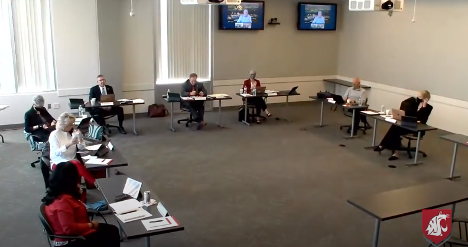Board of Regents approve 2.5 percent tuition increase, discuss vaccine mandate
Tuition increase to support student mental health; athletics department set to become financially stable by fiscal year 2023

The tuition increase will provide funding for student telehealth and telemental health services.
May 10, 2021
The WSU Board of Regents approved a 2.5 percent tuition increase for the 2021-2022 academic year, WSU Athletics budget revisions and the establishment of new master’s degree programs during their two-day meeting May 6 and 7.
Tuition
Student Regent Arliegh Cayanan was the only regent who opposed the tuition increase.
The tuition increase aims to provide the university with additional funding in the form of tuition waivers to support students’ mental health and “basic needs,” according to the Board of Regents agenda.
Mary Jo Gonzales, WSU vice president of Student Affairs, said university general health and mental health services vary depending on campus, but they hope to increase access to resources.
WSU is trying to pursue a way to create equity within the system. The university has been working on a system-wide effort to provide students with telehealth and telemental health services, Gonzales said.
Tuition rates for Summer Session will go into effect in summer 2022. Summer Session rates are based on the prior academic year part-time rates, said Stacy Pearson, WSU vice president for finance and administration.
Enrollment declined this past year and is expected to decline next year as well. WSU suffered about a $6 million loss in tuition revenue because of COVID-19, she said.
WSU received $60 million in federal aid to help with revenue losses and expenditure increases because of COVID-19. Around half of those funds will go toward student aid, Pearson said.
Athletics
The board unanimously approved the revised 2021 and proposed 2022 fiscal year athletics budget. The changes will balance the athletics budget and get the department financially stable by fiscal year 2023, according to the agenda.
Athletics will receive $35.6 million in external funding by selling general university bonds. The department will pay the bonds back through future Pac-12 media and bowl revenue distributions, according to the agenda.
Athletics saved $11 million from refinanced debt in fall 2020 to help the department cover COVID-19 related losses in the upcoming fiscal year, according to the agenda.
Athletics created various scenarios for its fiscal recovery plan and budget, Pearson said. The department is keeping in mind that life might not return to normal with COVID-19 still impacting the community.
One of the scenarios involves budgeting for 50 percent event attendance this coming academic year, she said. Another part of the fiscal plan for athletics is to establish a long-term department reserve as well as cumulative reserves.
Athletic Director Pat Chun said one of athletics’ priorities was to improve the department’s revenue generation areas.
Chun said athletics revamped marketing and corporate sponsorship areas. The changes immediately improved dividends prior to the pandemic.
Athletics reported that 60 percent of season tickets have been renewed, but the department hopes to reach 90 percent, he said.
Services and Activities Fee Committee
S&A fees are being decreased for Pullman and Global campus students in the upcoming academic year, Gonzales said. In addition, WSU Pullman dining and housing rates were not increased.
There is an annual limit of a 4 percent increase on S&A fees, Gonzales said. Each WSU campus retains 100 percent of its fees.
Student leadership on each WSU campus discussed the current fiscal year to decide whether they wanted to reduce some of the S&A fees, Pearson said.
The Global campus is reducing its fees by 10 percent, while the Pullman campus is reducing its fees by 3.2 percent, Gonzales said.
The allocation of fees is chosen by students and dictated by the priorities of each campus, she said.
The board also unanimously approved the new $5 per semester Cougs Against Hunger Student Food Pantry fee for full-time Pullman undergraduate students starting in the fall 2021 semester.
The ASWSU Pullman Senate proposed the fee to find a sustainable solution to address food insecurity among students and provide an adequately stocked food bank, according to the agenda.
Regent Marty Dickinson said the fee garnered a 70 percent approval rate from WSU students.
Safety Protocols, Vaccination and Testing Plans for Fall 2021
Domanic Thomas, WSU Vancouver vice chancellor for Student Affairs and Enrollment, addressed the complexities of WSU’s COVID-19 vaccine mandate for the upcoming semester.
Thomas said Student Affairs received many questions from students about WSU’s plan to accommodate those living in disadvantaged communities and medical deserts. WSU will continue to work to provide students with adequate access to vaccination sites.
Thomas said people have expressed feeling unsafe because the vaccine exemptions are too broad, whereas others expressed they believe the mandate impedes individual freedoms.
“[There’s] been a lot of education and conversation[s] talking to students and families about vaccination requirements … [and] vaccination exemptions that already exist within our state and across the country, and a matter of fact across the world,” he said.
WSU is set to conduct fewer COVID-19 tests in the fall with the university’s vaccine mandate now in effect, Thomas said.
If a COVID-19 outbreak arises, there may be requirements to prevent students and faculty members from coming to campus. WSU also plans to continue requiring face masks and social distancing, he said.
“That distance may shrink as we get through the fall,” Thomas said. “We’re going to continue working with our government and local health officials.”
Considerations to continue attestations in the fall are still underway, he said.
Parking Maintenance, Fees
WSU Transportation Services proposed a 10 percent average increase across annual parking permit types to support various projects. The board approved the increase during the meeting.
The university’s garages and surface parking lots need maintenance, Pearson said.
“While 10 percent does seem like a lot, we haven’t been increasing these rates very much. Our last one was 3.1 percent in 2019 and 1.9 percent in 2015-2016,” she said.
The proposed changes to WSU Pullman’s parking system rates and fines were brought to the board a year ago in March, but were deferred because of COVID-19, Pearson said.
New Master’s Degrees
The board unanimously approved the establishment of three new master’s degree programs in applied economics, civil engineering and business administration.
The degrees will be available through WSU’s College of Agricultural, Human, and Natural Resource Sciences, the Voiland College of Engineering and Architecture and the Carson College of Business, according to the agenda.
Regent Lisa Keohokalole Schauer said WSU hopes the degree programs will be available this fall.
WSU Vancouver’s Life Sciences Building Project
The board unanimously approved the schematic design for WSU Vancouver’s Life Sciences Building project.
The new facility is set to fulfill needs for undergraduate and graduate science courses, which includes new instructional labs, according to the agenda.
WSU is seeking $52.6 million in state capital support for construction, according to the agenda. WSU has already received $500,000 for pre-design in the 2019-2021 state capital budget in addition to $4 million toward design and pre-construction efforts in the 2020 supplemental capital budget.
If the state approves the requested funding, the project will start in December 2021 and end October 2023, according to the agenda.
Housing and Residence Life
Current models indicate that WSU can house up to 4,900 students on campus in the fall, said Ellen Taylor, associate vice president of student engagement.
The university will allow students living on campus to have a roommate, she said. Students can indicate their roommate preferences on their housing contract.
Taylor said WSU is prepared to house and accommodate students living on campus in isolation housing if necessary. The university plans to continue utilizing McEachern Hall to isolate students who may have tested positive for COVID-19.









